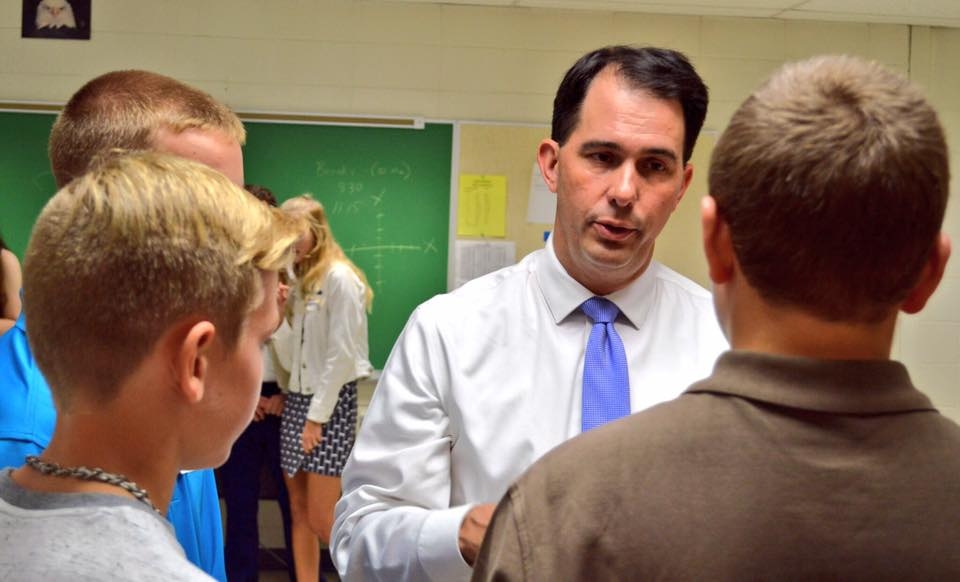National
Details of Walker’s 99 partial state budget vetoes

The governor plans to head to a school in Neenah to sign budget Thurs.
MADISON, Wis. — Gov. Scott Walker issued 99 partial vetoes of the Wisconsin state budget on Wednesday.
They include:
— PREVAILING WAGE: Walker sped up a repeal of the state’s prevailing wage requirement. Originally it was to take effect in a year, but Walker is getting rid of it immediately. The requirement, which is favored by unions, sets a minimum wage that must be paid workers on certain state construction jobs.
— LOW REVENUE SCHOOLS: Republican lawmakers inserted a provision in the budget to help low-spending schools that have long complained about being punished under the current state aid formula and caps that limit how much they can raise through property taxes. The budget would have allowed those mostly rural schools to increase spending per student from $9,100 to $9,300 this year and $9,400 next year using a mixture of higher state aid and local property taxes. Walker vetoed the entire provision, saying it could substantially increase property taxes without local voter input.
— UW PERFORMANCE FUNDING: Walker’s budget would have allocated $42.5 million in new state aid to University of Wisconsin System campuses that met detailed performance standards, including affordability and student workforce readiness. The Legislature’s Joint Finance Committee scaled the aid back to $31.5 million and would have allowed campuses to set their own performance standards. Walker vetoed the provisions, saying campuses likely would pick goals that would be too easy to meet.
— EARNED RELEASE: Eliminated finance committee language that would have modified the Department of Corrections’ earned release program. Under the program, nonviolent offenders who participate in alcohol and drug treatment can get out of prison early. The committee would have changed the program from a substance abuse treatment program to a rehabilitation program that addresses inmates’ criminal behavior. Walker said the change would create a burden on the department and that it should focus on substance abuse.
— QUARRY REGULATIONS: Walker removed a budget provision that would have reduced local control over quarries, which he did to secure enough Republican votes in the Senate to pass the budget. Walker said changes that significant should be introduced as separate legislation.
— TOLLING: He eliminated $2.5 million for a study into interstate tolling, another piece of the deal used to secure Senate GOP support for the budget. Walker said whether to petition the federal government to allow tolling in the state can still be considered without the study.
— HISTORIC TAX CREDITS: Walker limited the tax break that any restoration of a historic property can receive to $500,000. The Legislature had set it at $5 million after Walker initially called for an annual limit of $10 million for the entire project. Proponents had argued that limiting the tax credit will result in fewer historic properties, especially in small towns, being saved and used as tools to spur economic development. Walker estimates that the change will result in about $13 million less being spent on the tax credits over the next two years.
— ENERGY EFFICIENCY: He vetoed a provision that would have allowed K-12 schools to exceed property tax revenue limits to pay for energy efficiency projects.
— SCHOOL REFERENDUM VOTES: Walker limited when votes to exceed property tax limits can be held to regularly scheduled primary and general election days.
— JUDICIAL COUNCIL: A council that helps Wisconsin Supreme Court justice revise legal procedures would be eliminated, as Walker originally proposed. The budget committee attempted to save it but the Supreme Court quit funding it after the council’s executive committee gave its attorney a raise of more than $22,000.
— ELECTIONS COMMISSION: Walker cut five positions at the Elections Commission, which would have cost $304,000 annually, saying the commission has been working effectively with fewer staffers and can more cheaply manage busy times by hiring temporary workers or contractors.
— CAPITOL RENOVATION: He cut $1 million that was to be used to renovate the basement of the state Capitol.






